I read James Frey’s new book so you don’t have to.

Where to begin? With the book? It sucks as much as you think it does. With the author? He, too, seems to suck, but in more complicated ways than the book, and he is benefiting from a media ecosystem that rewards his particular brand of suckiness for reasons that are also complicated but also not very because they can be summarized by, yes, the word patriarchy.
Same old story. Shitty new packaging.
I suppose we should get the book out of the way.
Before I offer my own assessment, I’d like to share some of the advance reviews Next to Heaven has received:
“NSFW Gatsby.” —Book of the Month
“A sizzling beach read about the misdeeds of the rich.” —Wall Street Journal
“The novel on every beach towel this summer, all summer, everywhere.”—Esquire
“A Connecticut sex romp–cum–murder mystery... ‘big nods’ to Jackie Collins, Danielle Steel, and Tom Wolfe.” —Vanity Fair
“A satirical look at the ‘beautiful, wealthy and unsatisfied.’” —People Magazine
“Lurid... Propulsive... appeals to one’s baser instincts.”—New York Times Book Review Podcast
“A deliriously over-the-top portrait of decadence on the brink.” —Bustle
That is some effusive praise! And I am being entirely honest when I say that I approached this book with an open mind and an open heart, because I really would enjoy a book that delivers on these promises! Well, as someone who has been reviewing books professionally for… a lot of years, I freely acknowledge that book reviewing is a subjective art. But I do have some questions for the people who offered these book jacket-ready bites. For the Book of the Month reviewer: Have you read The Great Gatsby—or, maybe, have you re-read it since high school? I have a few for the Vanity Fair scribe: I am confident that you have read Bonfire of the Vanities, but are you actually familiar with Jackie Collins and Danielle Steel beyond their caricatures? Do you think that James Frey has read Collins and Steel and do you actually believe that he’s paying homage? Have you ever read a mystery, and what does the phrase “sex romp” mean to you? For the rest (except for People, and I’m getting to that): Can you define “sizzling,” “lurid,” “propulsive,” “beach read,” and “deliriously over the top”? This last is a comment, not a question: Kudos to you, People book reviewer, for saying something that sounds like praise but isn’t really, when you think about it. I see you.
What all of the above comes down to, really, is a longstanding gripe of mine. It has been my experience that, much more often than not, “literary”[1] authors who assay genre fiction do not understand why genre fiction works. Authors like Jackie Collins and Danielle Steel have written about rich people behaving badly, but their work is thick and juicy and filled with dramatic turns that are exciting largely because they would be absolutely unbelievable outside the outré universes they created. And these authors helped make graphic sex a standard feature of fiction targeted at women. A lot of that sex looks appallingly retrograde now, but these authors forged a middle path between straight-up porn and Henry Miller—no mean feat.
In Next to Heaven, there is one swingers’ party from which flow several affairs. The fact that most of the people at this party were already cheating on their spouses and are just switching partners takes some of the thrill out of this plot turn. As for the sex itself… I hesitate to revisit, but here are some passages I noted: Frey describes a man who has become impotent with his wife by writing that, even though they had fun talking dirty and role playing, “there was no well-cooked tube steak and no coconut cream explosion.” Euphemisms for penis include “sausage stick” and “yogurt cannon locked and loaded, ready to fire.” The most affecting sex scenes, for me, are those in which one character drugs and blackmails another so that he can use her in ways he cannot use his wife. This is not my idea of a sex romp.
As for the whole “rich people behaving badly” trope, Frey tells us nothing we don’t already know—or, at least, nothing we don’t think we already know from countless novels, movies, TV shows, and real-world scandals. I listened to Murder in the Dollhouse: The Jennifer Dulos Story on a recent road trip and it was significantly more compelling than Next to Heaven and I didn’t have to hear about tube steaks or yogurt cannons.
Similarly, while there is a murder-mystery component to this novel, Frey clearly doesn’t know shit about crafting a mystery novel—and I suspect that he would be offended by the idea that he would stoop so low as to write a novel that was merely a satisfying murder mystery. There is a murder. There is some mystery as to who committed the murder. Some readers my be surprised when all is revealed in a torrent of exposition at the end, but anyone who comes to this novel expecting the satisfactions of a good mystery are going to be sorely disappointed.
This brings me back to the references to Jackie Collins and Danielle Steel and it makes me think that some reviewers don’t know what kind of books Next to Heaven is actually competing with as a murder mystery that explores the insular worlds of the very wealthy. Lucy Foley writes locked-room mysteries set in fabulous locations. Her latest, The Midnight Feast, is a both a glorious send-up of 1% wellness culture and bespoke spirituality and a whodunit that kept me up well past my bedtime. Jo Piazza’s Everyone Is Lying to You (available July 15) is an absolutely captivating thriller set in the world of tradwife influencers. The fact that Frey set his novel in a barely fictionalized version of the very wealthy town where he lives just feels kind of lazy.
In fact, this novel generally feels kind of lazy. There’s a real first-draft vibe throughout, in terms of plotting, pacing, character development, and style. I’m not going to get into the details because I was already tired of this book when I started writing about it an hour or so ago, so I’ll just note a couple of Frey’s quirks.
Frey is fond of a literary technique that I am calling the ten-car pile-up. An example:
While Teddy laughed with Belle, inside he died. His failure, his impotence, and his humiliation were complete, and part of him died. Outwardly he was the same man he always was, but inside his soul had been crushed, destroyed, his confidence was gone, the soft swagger with which he had always walked through life just an act.[2]
This could have been one sentence. Maybe two short ones. If I had been editing? “While Teddy laughed with Belle, inside he died. The soft swagger with which he had always walked through life just an act now.” I mean, “soft swagger” is pretty good! And, having read the book, I can say that this tells us a lot about this character. Why bury it under all of these other words? To me, the ten-car pile-up detracts, rather than adds here. It’s possible that it would have been effective if Frey had used it judiciously, but he uses it a lot, and it has less impact each time he uses it.
There are also stream-of-consciousness riffs that… Well, here’s one. You can judge for yourself:
Hell is real, though.
Hell is real.
Hell is real.
For the living.
Sometimes you have to walk through it.
And it’s tolerable.
Sometimes you have to walk through it.
And it is the Inferno.
Maximum heat.
Maximum pain.
Maximum impact.
Not tolerable.
Careful readers will note that this stream-of-consciousness passage has a lot in common with the 10-car pile-up. My hot takes: Frey believes that repetition accomplishes a lot more than it actually does, and Frey is using this device to establish his place among American literature’s bad boys—or, perhaps, Bad Boys. And this is where we get to my critique of James Frey.[3]
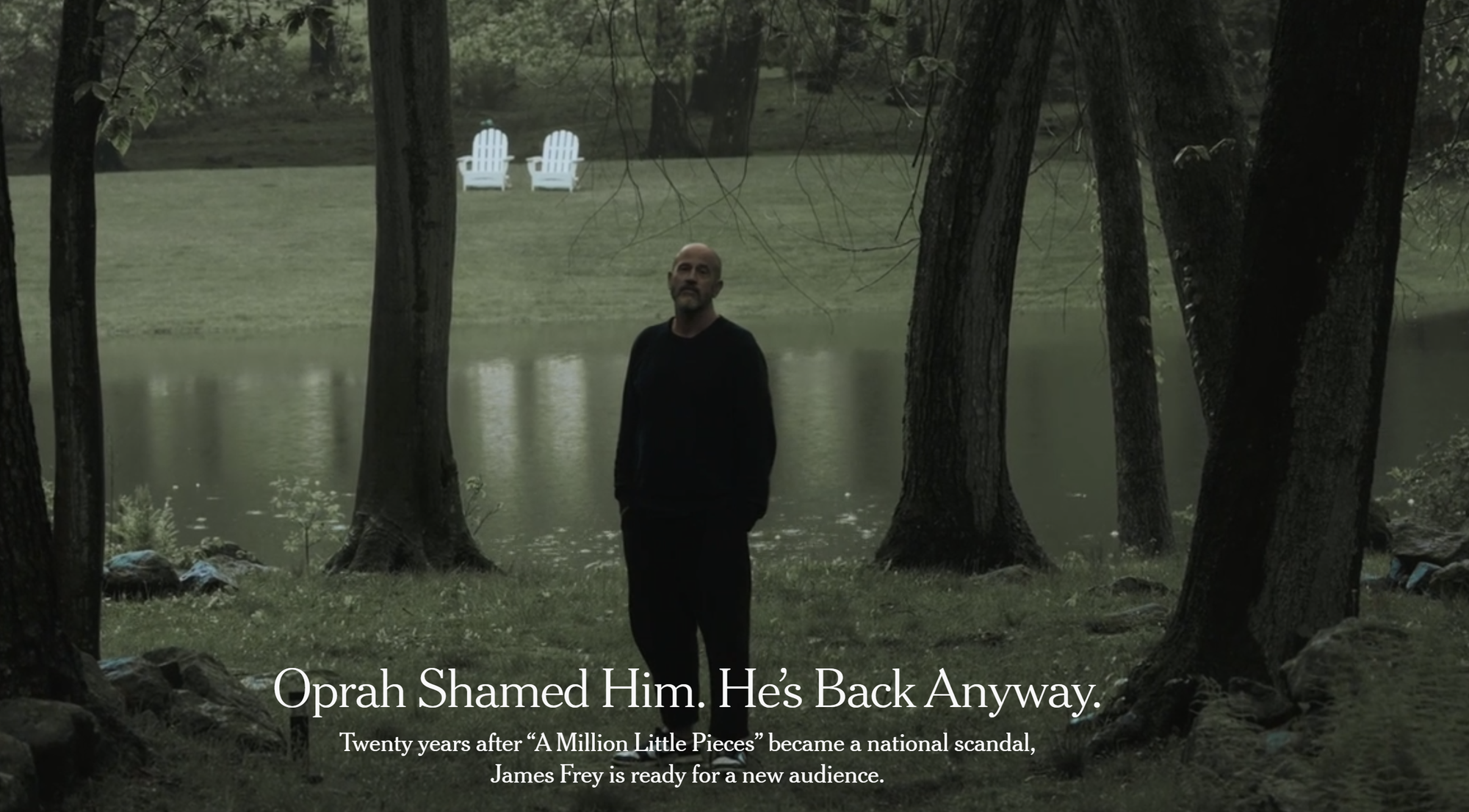
Let me start by saying that I was there at the beginning, by which I mean that I was working in the marketing department of a once-mighty bookstore chain when A Million Little Pieces broke. I remember that the cover image from that book[4] was also the cover of Doubleday’s catalog for that season. Frey’s publisher was pushing this memoir hard and doing what they could to make it a success. And a success it was! It sold a bazillion copies even before Oprah chose it for her book club, and the critical reviews were excellent.
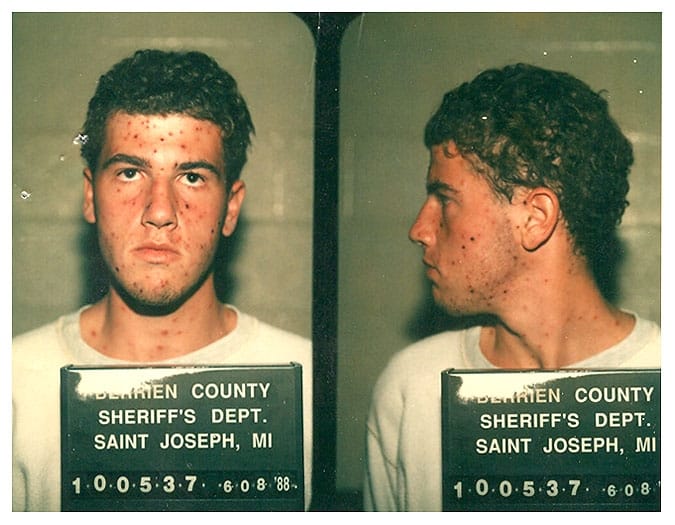
Then The Smoking Gun started digging into Frey’s personal history. What they found is that Frey had most definitely exaggerated his history as a Bad Boy. One result of The Smoking Gun’s investigation is that Frey got a spanking from Oprah on national TV. Another result was that Frey’s publisher had to recategorize his book and deal with a class action lawsuit in which people who thought they were buying a memoir discovered that they had bought a work of fiction instead. All of this is, in my opinion, fucking hilarious. What it is not is the origin story of my generation’s Ernest Hemingway or Jack Kerouac (which is to say Bret Easton Ellis or Chuck Palahniuk. Surely not David Foster Wallace).
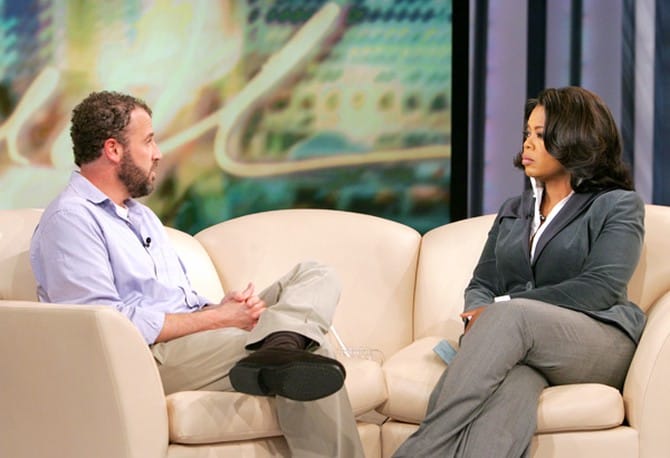
Nor is it the origin story of someone who has any business calling himself the first canceled man, which seems to be the mantle he is now trying to claim. If you’re looking for a good hate read, I highly recommend the recent New York Times profile of Frey—I’ll even give you a gift link!—but if you’ve had your fill of insufferable males for the day—or week, or year, or lifetime—I’ll give you a few revealing quotes from the piece.
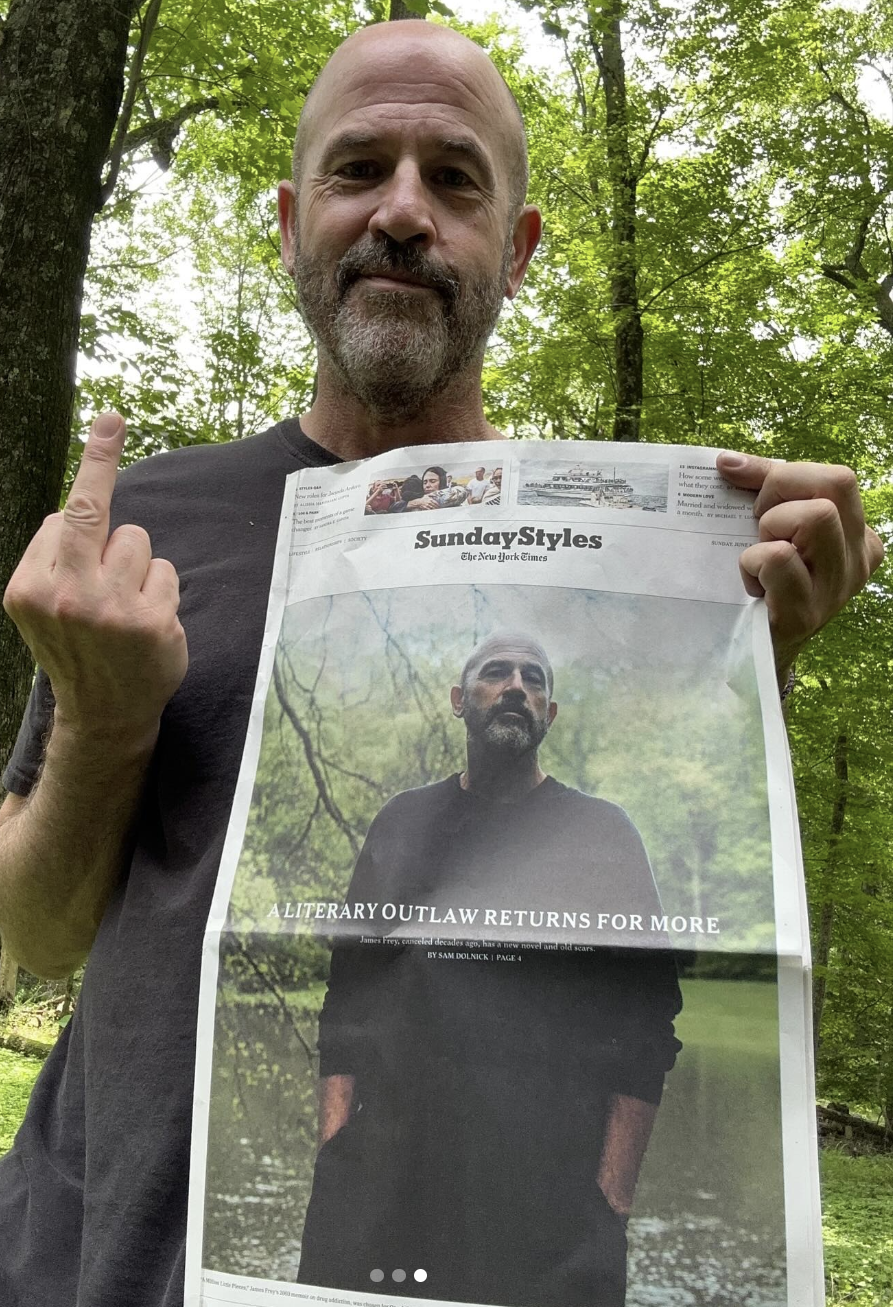
“For a long time, writers were fearless sorts of people who held mirrors up to society and showed us what was up. And that’s not the case anymore, right?”
“Writers are scared of getting canceled,” he told me. “Writers are scared of making work that makes people uncomfortable. Everybody wants a hug and a Pulitzer. I don’t. I don’t need either one.”
“We’ve all been told to be polite, to be good little boys, to go to college and follow the rules,” Frey told me from his extra-large mohair Eames chair, which he had custom-made so that he could sit in lotus pose. “Not me.”
“You might be the most influential lady in this world, you won’t stop me. I will lower my head and I will walk forward and I’ll keep throwing punches until I die. You can’t stop me.” [5]
“I was working in autofiction before that word existed,” he said.
Let’s unpack, shall we? I think Sylvia Plath would have some things to say about the idea that Frey invented autofiction, as would many other authors—including the guy who seems to have coined the term “autofiction” in 1977. This claim is just silly.
As for the rest of these quotes, I have a couple of key takeaways. One is that Frey’s response to getting busted for wild self-aggrandizement seems to be an even more sincere commitment to self-aggrandizement. The second is that Frey clearly doesn’t read much—or, perhaps, Frey doesn’t read books by queer authors, Black authors, Brown authors, or women. I say this because I can think of a number of authors who are out here showing us what’s up and making people uncomfortable. Has the years-long effort to ban books in public libraries and public schools failed to catch his attention?
If I take a closer look at Frey’s complaints, though, I don’t think he’s talking about writers so much as he’s voicing more generic grievances emanating from the manosphere. I think he’s talking about guys who can’t tell a co-worker she’s pretty anymore and comedians who can’t joke about queers without getting into trouble. Which is as tiresome as it is pathetic. In presenting himself as cancel culture’s proto-martyr, Frey is aligning himself primarily with people—mostly men—who have publicly shared comments that are racist, homophobic, transphobic, xenophobic, or misogynistic, and with men who fall somewhere between sex pest and serial rapist. It turns out that, yes, many of us find these to be serious offenses—and maybe Frey is guilty of all or some of them!—but what he got “canceled” for was—again—exaggerating his actual transgressions to make himself seem like a badass. These are, to me, categorically different transgressions. The first is truly harmful. The second is just sad.
Also? Frey is engaging in some revisionist history, and I haven’t seen any of the participants in his glow-up call him out on this. What Frey and his fancy fans don’t mention is that he tried to sell A Million Little Pieces as fiction before he sold it as a memoir. As a novel, Frey’s manuscript was rejected 17 times before he sold it to Doubleday as a memoir. Frey is probably right when he suggests that online culture has inured us to lives curated to sell an attenuated version of reality. And I will even add that there is something kind of fucked-up about readers wanting to know that the pain they’re reading about is real, whether that means consuming narratives of suffering as memoir or assuming that these narratives are autobiographical even when they’re presented as fiction.[6] But Frey wasn’t critiquing this dynamic, and he couldn’t have been critiquing social media, when he sold A Million Little Pieces. He was working the system and, in doing so, made himself a millionaire.
Frey never mentions #MeToo in the New York Times piece, but I don’t think it’s outrageous to suggest that he identifies with the men who were held accountable during that brief moment when we were, you know, holding men accountable. Regardless, he does seem to be benefiting from the rush to exonerate that many once-canceled men have enjoyed. Louis CK won Grammys in 2022 and 2023. Since declaring himself “canceled” in 2018, Johnny Depp has toured with Jeff Beck, sold a whole lot of paintings, starred in a couple of movies, and—maybe—been invited back to the Pirates of the Caribbean franchise. Andrew Cuomo is poised to become mayor of New York. And now Frey is getting a whole lot of earned media for a crappy book that would likely have gone nowhere if he hadn’t mythologized his life and gotten caught doing it.
BONUS CONTENT!
If you’ve made it this far, you deserve prizes.
I didn’t want to read Katy Waldman’s review in The New Yorker until I’d finished writing my own take, but she says a lot of what I said but much more succinctly! (Also the accompanying photo of James Frey is funny.)
And I’ve thrown together a list of books to check out if you’re looking for something that deserves any of the praise that’s been heaped on Next to Heaven. Some of these books are a bit frothy. Others aren’t. Some include a murder mystery. Others don’t. I’m honestly not sure that any qualifies as a “sex romp” but many of them do include sex. There are for sure rich people behaving badly in most if not all of these books. What they definitely have in common is that I enjoyed them.
Why the scare quotes? Because I believe that “literary fiction” is as much a genre as romance or science fiction. There is artful fiction that falls outside of this category, but there is a whole industry built around books written by people who came out of the Iowa Writers’ Workshop or Brown or NYU—or write like they came out of the Iowa Writers’ Workshop or Brown or NYU—and these books have their own tropes and stylistic quirks. Frey’s relationship to this kind of fiction is interesting and I’ll get to that. ↩︎
If you’re wondering if Teddy is the impotent man mentioned above, you are correct. He is actually one of the more complex, believable characters in this novel, and the idea that he would think of his own erect penis as a “well-cooked tube steak” is not credible and kind of weird. I really don’t want to get into this, but I was at a cookout just last weekend and when I read “well-cooked tube steak” I think of a grilled hot dog and, wow, that is just not sexy. ↩︎
This is such a nice transition that I don’t want to mess with it, but there is something I left out. Another thing that Foley and Piazza have that Frey does not is a sense of humor. I don’t mean that either author had me rolling in the aisles, but both do make me laugh and—more importantly—they don’t take their work (or, perhaps, themselves) too seriously. The same cannot be said of James Frey. Credit where it’s due, though: Frey did make me laugh out loud once. There is a character whose heroes are Kanye West and Eric Trump. Having any Trump as a hero is sad. Having Eric Trump as a hero is funny. ↩︎
That cover is a fucking masterpiece and designer Rodrigo Corral continues to do amazing work. ↩︎
I will give Frey this: When he says, of Oprah, “She told more lies to the public times a thousand than I ever have,” he is correct. I know that Oprah Winfrey has become something of an elder stateswoman, but she caused a lot of damage with her relentless diet foolery and I don’t think there is any way Drs. Oz and Phil would have positions in the federal government right now without the platforms that Oprah gave them both. ↩︎
I cannot not mention the JT Leroy saga here. ↩︎
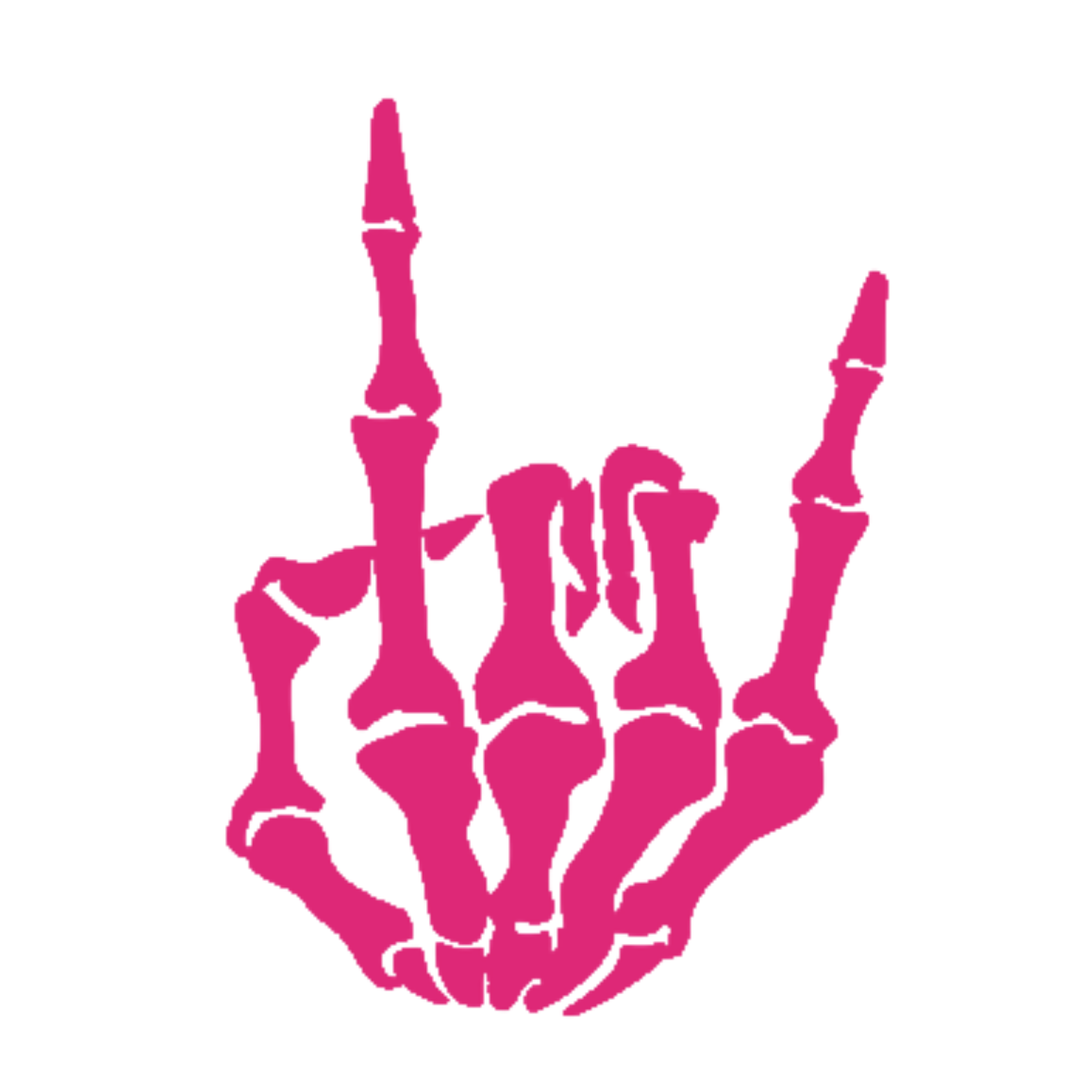

Comments ()